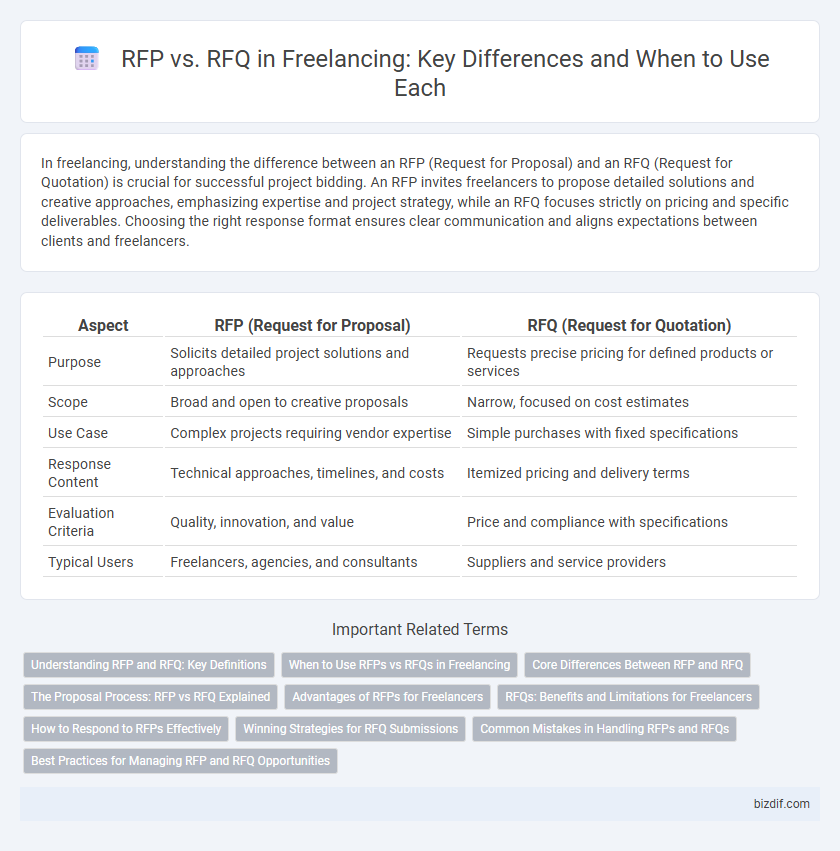In freelancing, understanding the difference between an RFP (Request for Proposal) and an RFQ (Request for Quotation) is crucial for successful project bidding. An RFP invites freelancers to propose detailed solutions and creative approaches, emphasizing expertise and project strategy, while an RFQ focuses strictly on pricing and specific deliverables. Choosing the right response format ensures clear communication and aligns expectations between clients and freelancers.
Table of Comparison
| Aspect | RFP (Request for Proposal) | RFQ (Request for Quotation) |
|---|---|---|
| Purpose | Solicits detailed project solutions and approaches | Requests precise pricing for defined products or services |
| Scope | Broad and open to creative proposals | Narrow, focused on cost estimates |
| Use Case | Complex projects requiring vendor expertise | Simple purchases with fixed specifications |
| Response Content | Technical approaches, timelines, and costs | Itemized pricing and delivery terms |
| Evaluation Criteria | Quality, innovation, and value | Price and compliance with specifications |
| Typical Users | Freelancers, agencies, and consultants | Suppliers and service providers |
Understanding RFP and RFQ: Key Definitions
RFP (Request for Proposal) is a detailed document organizations use to solicit comprehensive solutions and vendor approaches for complex projects, emphasizing project scope, qualifications, and methodologies. RFQ (Request for Quotation) primarily focuses on obtaining price quotes for specific products or services with clear specifications and quantities, often used in straightforward purchasing decisions. Understanding the distinctions between RFP and RFQ helps freelancers tailor their responses appropriately, increasing the chances of securing contracts in competitive bidding environments.
When to Use RFPs vs RFQs in Freelancing
Freelancers should use RFPs when projects require detailed solutions, creative input, or complex deliverables that allow for multiple approaches, enabling clients to evaluate proposals based on value and expertise. RFQs are ideal for straightforward tasks with clearly defined specifications and fixed prices, where the primary concern is cost comparison rather than detailed project execution. Choosing between RFP and RFQ depends on the project's complexity, budget flexibility, and the need for tailored services versus standardized outputs.
Core Differences Between RFP and RFQ
A Request for Proposal (RFP) seeks detailed solutions and creative approaches for complex projects, emphasizing vendor expertise and project methodology, while a Request for Quotation (RFQ) focuses strictly on price for clearly defined products or services. RFPs typically include evaluation criteria beyond cost, such as technical capabilities and experience, making them suitable for strategic sourcing. In contrast, RFQs prioritize competitive pricing in scenarios where specifications and requirements are precise and standardized.
The Proposal Process: RFP vs RFQ Explained
The proposal process in freelancing differentiates RFPs and RFQs by scope and detail; RFPs require comprehensive solutions and strategic insights, while RFQs focus strictly on pricing and deliverables. Freelancers respond to RFPs with detailed proposals highlighting expertise, project approach, and timelines, whereas RFQs demand specific cost estimates and fulfillment capabilities. Understanding these distinctions helps freelancers tailor their submissions effectively, increasing the chances of winning contracts.
Advantages of RFPs for Freelancers
RFPs (Request for Proposals) provide freelancers with the advantage of showcasing creativity and customized solutions beyond mere pricing, allowing for differentiation in competitive markets. They enable freelancers to demonstrate their expertise, project approach, and value-added services, which can lead to higher-value contracts and long-term client relationships. RFPs often include detailed project requirements and evaluation criteria, giving freelancers clearer guidance to tailor their proposals effectively.
RFQs: Benefits and Limitations for Freelancers
RFQs (Request for Quotation) streamline the bidding process for freelancers by providing clear, detailed project requirements and fixed budgets, enabling precise and competitive pricing. However, the rigid structure of RFQs can limit creative input and flexibility, often confining freelancers to predefined scopes without room for negotiation. While RFQs offer quick decision-making advantages, they may restrict freelancers seeking projects that allow for innovation or scope adjustments.
How to Respond to RFPs Effectively
Responding to RFPs effectively requires a clear understanding of client needs outlined in the document and tailoring your proposal to address specific project goals, deliverables, and evaluation criteria. Highlight your relevant experience, provide detailed timelines, and include transparent pricing while ensuring compliance with the submission guidelines. A well-structured proposal with concise, persuasive content increases the chances of winning freelance contracts by demonstrating professionalism and alignment with client expectations.
Winning Strategies for RFQ Submissions
Crafting winning RFQ submissions requires a clear understanding of project specifications and precise cost estimations, ensuring bids reflect competitive pricing without compromising quality. Emphasizing transparent communication and timely delivery of detailed, compliant quotes resonates strongly with clients seeking straightforward procurement processes. Leveraging past performance metrics and showcasing reliable supplier references enhance credibility and increase the likelihood of securing contracts through RFQ channels.
Common Mistakes in Handling RFPs and RFQs
Common mistakes in handling RFPs and RFQs include misinterpreting their purpose, where RFPs focus on detailed project proposals and strategic solutions while RFQs target price comparisons. Overlooking critical evaluation criteria such as vendor capabilities, compliance, and project scope often leads to poor supplier selection. Neglecting clear communication and deadlines within responses can result in incomplete or disqualified bids, undermining the procurement process.
Best Practices for Managing RFP and RFQ Opportunities
Effective management of RFP and RFQ opportunities involves clear documentation of project requirements and detailed scope to ensure precise vendor responses. Leveraging technology platforms for tracking submissions and maintaining transparent communication channels enhances collaboration and reduces response time. Establishing evaluation criteria aligned with project goals enables objective comparison and informed decision-making during the selection process.
RFP (Request for Proposal) vs RFQ (Request for Quotation) Infographic

 bizdif.com
bizdif.com